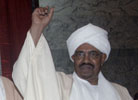
News broke today that the International Criminal Court had issued a second arrest warrant for Sudanese President Omar al-Bashir – this time for genocide. In a statement from The Hague, the Court announced that its pre-trial chamber considered there were reasonable grounds to believe President Bashir is responsible for three counts of genocide against the Fur, Masalit, and Zaghawa groups in Darfur.
The three counts include genocide by killing, genocide by causing serious bodily or mental harm, and genocide by deliberately inflicting on each target group conditions of life calculated to bring about the group’s physical destruction.
In the daily press briefing at the State Department, spokesman Philip Crowley reacted to the news by saying, "Everyone is entitled to a day in court, and we think the sooner that President Bashir presents himself to that court, the better."
A statement issued by Enough, Genocide Intervention Network, the Save Darfur Coalition, and the American Jewish World Service recognized the Sudanese government’s responsibility to hand over President Bashir to the ICC but noted, “Barring this unlikely cooperation, the United States and the international community should work together to ensure Bashir’s swift arrest.” (Read the full statement for reactions from leaders of each group.)
Today’s news settles a question left open ever since the ICC filed its initial charges against the first sitting head of state in March 2009. The pre-trial chamber originally issued arrest warrants for Bashir and two top Sudanese officials for war crimes and crimes against humanity, but it rejected the genocide charge, prompting the ICC chief prosecutor to file an appeal. In February, the Court re-opened the possibility that the genocide charge would come when it decided that the pre-trial chamber had used an inappropriately high burden of proof to evaluate whether there was reason to believe Bashir could be tried for genocide. (We boiled down that decision in this blog post at the time.) Today’s decision paves the way for the Court to try Bashir for genocide once he is delivered to The Hague.
Focus quickly shifted from this breaking news alert to expressions of concern about how the news would be received by the ruling party in Sudan. When the first round of arrest warrants was issued in March 2009, the Sudanese government expelled 16 international and Sudanese aid groups from Darfur, leaving an estimated one million people who were dependent on aid vulnerable. In a region where three million people are displaced, any interruption in distribution can leave civilians at great risk. Emergency contingency plans enabled remaining aid groups to fill gaps in basic services, but the few groups who have been able to investigate on the ground report that treatment for survivors of sexual violence has still not been restored, more than a year later.
“President Obama should make abundantly clear his unequivocal support for peace rooted in justice in Sudan by sending the message that consequences will result from any retaliation against Sudanese civilians as a result of this warrant, and by building stronger international support for this warrant,” Enough’s John Prendergast said.
It was already afternoon in Sudan when the news broke today, so we’ll continue to watch this story as it unfolds.
Photo: Sudan’s President Omar al-Bashir at his inauguration in May (AP)

